Tarantino Speaks Out: Police Brutality vs. Cinematic Violence
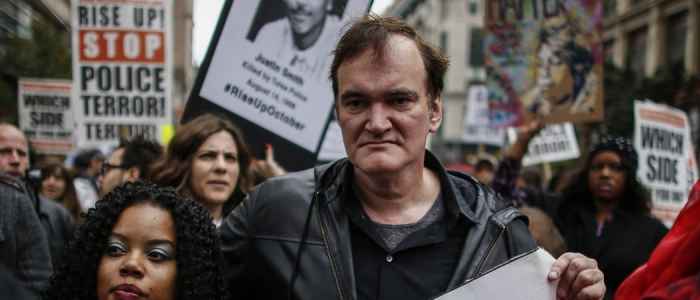
Due to the spike in police brutality in 2015, many voices were raised in protest against what has become a scourge to embattled African-American communities all over the nation. One must wonder, on the whole, whether there has really been an increase in the violence perpetrated against young men of color, or if it is that the nation can now actively see the reality that these communities face everyday. With the ease of access to video recording technology on cellular devices, individuals have been able to capture these crucial moments of confrontation between citizens and police officers, posting them to social media for all to see. Death has become a visceral reality, the videos produced from these events are shaping a new visual regime wherein individuals attempt to gain justice in places where justice is a meek and meager force.
At these moments, the part of the citizenry with the biggest burden of responsibility to speak out in protest, are those with a very public presence and a voice that will be heard and understood by many. This is where writer-director-producer, Quentin Tarantino enters as a vociferous voice against the really existing threat of police brutality in the nation. Speaking at protests and for popular media, Tarantino has condemned the actions of officers across the nation, actions that have resulted in the deaths of individuals like Eric Garner and Tamir Rice. Virulent backlash from officers’ unions came in the form of personal attacks on Tarantino’s own artistic practice, a career of movie making that deals heavily in on-screen violence of every kind. So the question then becomes, does a high-profile cultural producer like Tarantino have the moral grounds to speak out against issues of social justice, especially when they circulate around issues of violence?
Several major media sources covered this issue at the time, including the Huffington Post’s article and interview, MSNBC’s Chris Hayes’ interview and reportage, and the Guardian’s revealing discussion of the phenomenon. Reporting on conditions and reactions, no journalistic endeavor was made to actually get at the meat of the charge made against Tarantino, this is what I would like to explore, briefly, by looking to a few films by the visionary writer-director. This is a conversation that circles around the concept of a visual cinematic violence, disseminated throughout the popular cultural sphere and actions taken by trusted law enforcement officials while occupying vetted positions of power.
Here, we should turn to some provocative comments from Tarantino, reported by the Huffington post. At a Black Lives Matter demonstration Tarantino had stated, “I was under the impression I was an American and that I had First Amendment rights, and there was no problem with me going to an anti-police-brutality protest and speaking my mind,” Tarantino said. “Just because I was at an anti-police-brutality protest doesn’t mean I’m anti-police.” Several points pop out from this simple statement, first being that Tarantino is in fact a private American citizen in addition to his role as celebrity writer-director, and second, there is no overt contradiction between the act of protesting police brutality against other citizens and still supporting the municipalities overall. Cinematic violence has a proven place within the larger culture as an arena for catharsis, and beyond this Tarantino’s films deal with complex issues of cinematic style, genre and visual history.
In one of Tarantino’s most recent films, Django Unchained, overt issues of a race and violence come to the fore as the entire film is staged as an elaborate cathartic-revenge film. However, to get at the real meat of the film, it unfolds with such dynamism and wit, ultimately staging the tale of a freedmen’s epic quest to reunite with and free his still enslaved wife in the antebellum south. Colonial racists in all their grotesque and quivering hatred are leveled by a singular rebellious freedmen who rallies all those he can along his way, he is allied with a radical bounty-hunter turned abolitionist figure, who seeks the similar termination of all major plantation owners and slave-traders. The writer-director takes anything but a neutral stance here writing a pseudo-revisionist historical plot-line wherein vengeance can be meted out against the worst elements of the American historical past. Tarantino does so through the lens of pulp-fiction but only to cynically point up the fact that it is only fiction and that the reality of slavery and its repercussions still pervade and echo through our present day reality, in ways enumerable and disturbing.
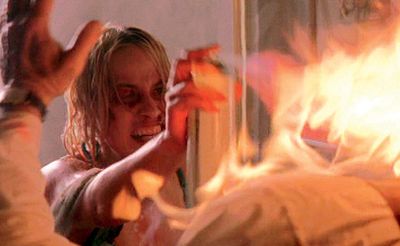
Turning to two films by Tarantino, True Romance (1993) and Natural Born Killers (1994), it must be stated that the way violence between vigilante perpetrators, criminals and police arise within the cinematic space, keeps in line with a kind of de-hierarchizing Post-Modern thematic. Characters are transgressing against normalized boundaries of behavior because very simply, its a movie and it feels good and it feels right to visualize acts of rebellion against the status quo. When Clarence and Alabama hit the road in True Romance, after seizing a score from a mob boss, they are also breaking free from the mediocrity of their daily lives, where they toil (Alabama as a prostitute and Clarence as a movie rental clerk) for an exploitative wage labor system. Given his career of storytelling that reinforces the significance of the untold tales from the margins, his belief in the necessity of “pulp fiction,” is it not also valid when Tarantino states, “I’m a human being with a conscience,” and continuing, “If you believe there’s murder going on then you need to rise up and stand up against it. I’m here to say I’m on the side of the murdered.”
Even in Tarantino’s most violent films, there is always a type of justification or structure of consequence. It is clear that he has created an aesthetic of blood and gore that ties into the pulp sensationalism of exaggerated crime fantasy, an aesthetic of criminal camp. Looking specifically to Natural Born Killers as a pop-cultural text of transgression, Tarantino deals in a complex formulation of the rigid social order. He uses surrealist tactics and new wave cinematic distortions to show scenes of abysmal reality, such as main character Mallory’s horrific home life with a rapist father and complicit mother.
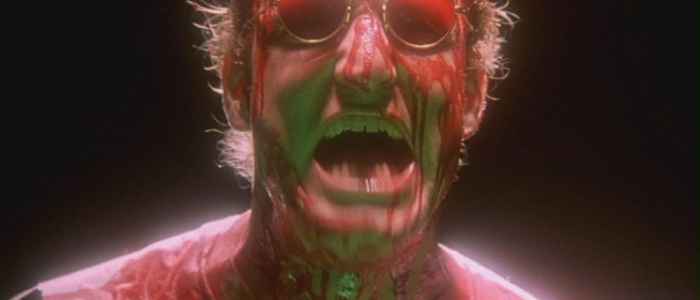
In this film, Tarantino is beside himself to show the uncanny nature of our social realities, and in a glorious move, he invites the viewer to journey with characters Mickey and Mallory as they blow the whole thing to hell, in utter defiance of the rough hand society has dealt them. The couple is incarcerated only to break free, a true mediation on love and the American dream, they are an unstoppable power couple looking for a more unconventional sense of success. Complete with an ending segment where the couple rise to infamy in a reality TV style exploit, there is also a satirical jab on American society’s/ pop-culture’s prevailing fascination with organized crime and romance with infamous criminals.
Ultimately the couple escapes a brief but traumatic incarceration to continue on in a love surpasses all physical barriers type conclusion, and the documentarian is executed as a symbol of manipulative, ratings driven network production. Throughout the film, arguably one of his bloodiest, Tarantino uses an eclectic montage of styles so that the viewer is constantly jolted and jilted into a critical contemplation of the narrative. This technique maintains a crucial distance between the constructed cinematic space and the real space of social existence of the viewer. Breaking the suspension of disbelief, the director winks at his audience making explicit the art and artifice of his creation.
Catharsis, a term established by Aristotle in his Poetics of 335 BCE, is what modern critics have established as denoting a collective purge of un-vented or pent-up emotional or psychical energies, and theater or cinema provides us with this space. Characters transgress where we cannot or may not, but also, per more recent scholarship on catharsis, it can connote the ways in which narrative spaces allow us to enter a social scenario and contemplate its affect in order to better equip ourselves with an emotional arsenal to handle the everyday. Tarantino’s films allow us to contemplate the various and underlining motivations and intentions of the violent act and actor, and ultimately as in Natural Born Killers see them reigned in as law and order briefly but ambivalently prevail.
High profile films such as Kill Bill, volumes one and two, which become easy targets for anyone looking to point out the excessive degree of violence in Tarantino’s oeuvre, are terribly complex homages to cult genres. Here, the execution of certain fight scenes, murders and destruction fall in line with the sequences of Kung-Fu action films from the 1960’s and 1970’s, these films are now part of the cult-genre canon and saw a veritable resurgence after Tarantino’s homage. Again, instead of an overt and senseless violence, there is a meditation on violence as it appears in the pop-cultural realm of visual aesthetics, by appropriating the dynamism of the Kung-Fu fight sequence the film plays up and acknowledges the art form of the cult genre.
Beyond this play on genre appropriation, the films, both part 1 and part 2, are a perfect nexus of Tarantino’s major thematic inquiry into the human motivations toward the violent act: working with major overarching thematics of vengeance, desperation and lust/ desire. These come into play in Kill Bill, where the main character, known only as ‘the Bride’ or ‘Black Mamba,’ must seek vengeance for the brutal killing of her entire wedding party. Clearly, this is a mythic fiction and a dramatic departure from the stark realities of the protesters that Quentin Tarantino, as U.S. citizen, actively rallied in support for throughout 2015.
In this same vein of post-modern appropriation and self-conscious genre reference, Tarantino also walks the contentious line of outright scenic quotation in his early masterpiece Reservoir Dogs (1992), wherein 60’s/70’s “Blacksploitation” crime-dramas serve as template for major sections of the film. Once again, Tarantino is turning a critical eye on the melodrama and staging of violent criminality as it appears in spectacularized form within Hollywood cinema but also B-film reels from 70’s underground cinema. Grafting scenarios and dialogue existent within the plots of B-films that largely stereotyped a problematic vision of ‘black’ criminality, onto the white albeit mixed ethnicity cast of his film, Tarantino directs the viewer to the underlying elements of criminality as a troubled resistance to the psychic pressures of society.
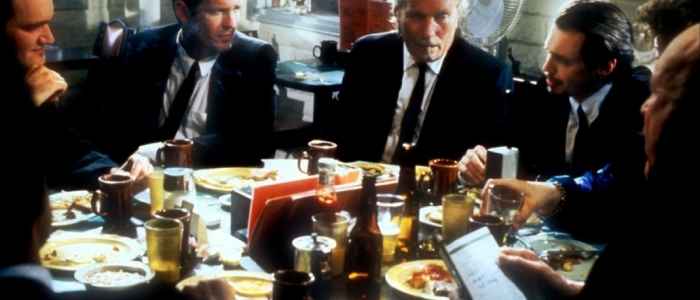
A simple scenario in the opening sequence serves to elucidate the point: a group of arguably white collar gangsters, career criminals, all sit around a dinner table discussing the next hit, we drop in on them discussing tip for the bill and see one character ‘Mr. Pink’ vehemently resisting the need for a tip. Overall, Pink’s protestations are squashed as the table of criminals lay down the necessity of tipping in order to maintain the livability of service industry labor, it is a matter of principle and decorum – this coming from a group of felons, and one who will expose himself as especially sociopathic and blood thirsty.
Another scene towards the climax of the film, worth noting for its intimate staging of the confrontation between officer and criminal, is one in which the character ‘Mr. Blonde’, in a tyrannical assertion of power, chooses to torture a captive officer after the gangs failed heist. In one of the most notable scenes of the film, Blonde dances around the officer vindictively brutalizing him and eventually cutting off his ear, this is decidedly against the wishes of the rest of the criminal squad. Significantly, this brutalization is overtly framed as the actions of an sociopath who has himself been broken by the soul corrupting structure of the prison-industrial complex, catharsis here is filtered through the mentality of a psychic break.
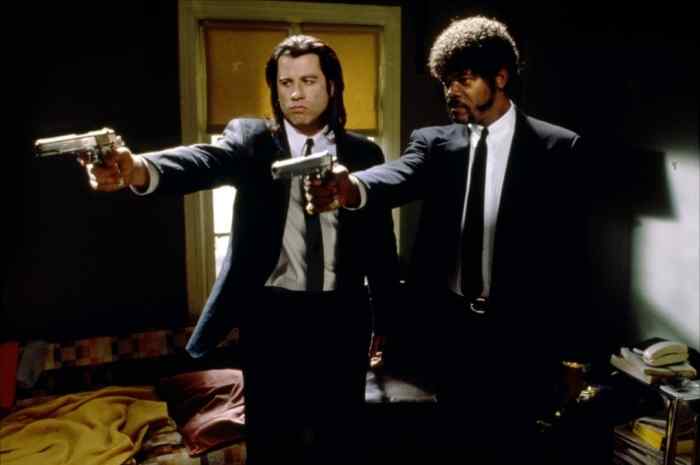
Finally, we can look to the premiere vehicle of Tarantino’s career and fame, Pulp Fiction (1994), which stands as a testament to the collision of marginal realities and sub-cultures addressed by the director in his extensive cinematic career. In the film, the drug culture of the 1980’s is explicitly dealt with, there is even a depiction of a main character being epipenned back to life as an shot of adrenaline surges to her heart and brings her out of a catatonic heroin overdose. The two hitmen in the film, Vega and Jules, are similarly made into very raw and trembling human specimens through dialogue scenes where their personalities are revealed and they are shown to deal with the act of murder in very different ways.
One scene that lays out the strange mix of religious symbolism and criminality that exists in the film is the combined execution of a squad of young men indebted to the crime lord employing the two hitmen. Here, Jules quotes the scripture of the Old Testament and infuses his hit for the collection of debt with the wrath of a vengeful god coming down to seize claim of what has been made his through corruption and deceit. Disparity between a mythic film space and lived reality lies rife throughout and Tarantino continually smiles and winks from behind the artifice of his creation, signalling to all that these are cinematic spaces for enjoyment, contemplation and catharsis.
What do you think? Leave a comment.











People are fascinated by individuals who commit heinous acts.
Its true, and here in America we seem to have a deep routed and historical love affair with the criminal and vigilante. This goes back to the 1920’s with the citizenry’s infatuation with gangsters and gun-runners like Al Capone.
Great conclusion!
Given the tragic events of today, your article seems very timely. I learned so much about Tarantino and I was never a fan. Maybe I will give QT a chance.
he loves ya hun.give him a chance
I will check it out. Netflix is my best friend. : )
Yeah, Netflix is the primary form of Americanization in the digital economy. That sentence makes me barf, but hey, the native americans say barfing is a form of purification… I digress
The most important thing I’ve learned about Tarantino movies is that he creates stories about how America is and not how we want it to be. Personally I think Django Unchained was a really sappy love story ending. But hey, to each their own rom com.
QT challenges narratives of masculinity that are dehumanizing by using blood. Everybody’s blood looks the same. If you prick anybody, do they not bleed? Is a rose by any other still a rose? Does a man feel less because he has a big dick and lots of money (reservoir dogs)?
I feel like Quentin Tarantino writes movies that lets men know they are human like women. Because as a woman, I really feel men are denied both their masculinity and their humanity by patriarchal images of power that leads to senseless death.
My son loves QT and he would agree with you.
I love it when men know their sons.
In the 7 habits of highly effective people there are many anecdotes about building trust between generations. I really admire QT because his body of work is definitely an exercise in trust building.
I HATE zombie movies/tv (except sean of the dead). Can’t watch American Horror Story even if everyone thinks it’s hokey. But the blood in QT’s movies aren’t.. is the word perfunctory?
Anyway, if QT had an origin movie it would be hell ride.
Let me know what you think/
You have one article but I don’t know how to link to it. What’s the link?
Dig your outlook, Munjeera.
My article is Diversity Matters in Movies. Please stay tuned for my next article which I hope will be published here soon.
Thanks for the shoutout. BTW, I am a mom.
Hooray, it is always my most sincere hope to simply convert someone to powers of Tarantino and his filmography!
wo
rd
One reason I love QT movies is there is no hero or victim, only consequences. in reservoir dogs, all these men are having their last meal served by a maiden/Madonna figure they don’t respect. but ultimately these men are heisting to find a woman. the only time in reservoir dogs there is regret for death is when a working class woman is killed.
QT loves his mother the best he knows how/hao.
I don’t care for Tarantino’s movies, but people are allowed to like what they like and hate what they’re merely indifferent towards.
Police, like a lot of other government workers I could mention, have a tendency to develop an “Us vs. Everyone Else” attitude on the job. It is hard to understand what they go through in their day-to-day work, unless you experience it for yourself.
you know how people feel when they watch the 9/11 twin towers video? that’s how I feel when I see a police officer. I never feel that watching a QT movie.
You know how people call the cops for help? I know if I call the cops my life is ruined, not because I’m doing anything wrong, but because I’m labelled wrong. In QT movies, especially Django unchained, it’s one of the few movies out when a women is labelled ‘worth it’ and she doesn’t even have to say anything to be worthy.
I think cops are a great idea, but the truth is the system is designed to police labels not crimes. So in QT movies I see not even a policing of labels, just an unravelling of labels that create violence. For example in Hateful 8, Jennifer Jason Leigh plays a character who is known to have killed ‘only’ one man, but everybody else like the bounty hunters have killed many more people. It’s definitely a case where a woman is being policed for doing something reserved for men.
but I understand not caring for QT movies. they are disturbing. the rape scene in the hateful 8 isn’t any less disturbing because it’s a black man raping a racist… rape is about power. we don’t police rape, and i’m sure many people watched the rape scene thinking that it was justified. but bruce dern’s character’s reaction to the rape story was exactly mine. lot’s of men talk about raping women with similar indifference and justification for hatred toward women. disturbing because it is real
I hope Tarantino will be impressed by the millions of people in the US and around the world who respect his courage and love his work.
How ironic, the purveyor of depraved violence in popular culture is against police violence. Doesn’t he think the marketing of violence as a former of entertainment has an overall impact on broader cultural values?
You’re confusing fantasy with reality. And where is your evidence his films ‘impact on broader cultural values?’
Where would one find such evidence?
Great to see him speak up against the out-of-control police culture of violence in the United States.
I would never have pegged QT as a sensitive soul when it comes to people being killed, since he’s so happy to dispatch quite a few in all his films. I suppose the clue is in the fact they are films, not reality.
Love QT, the fucking balls on the guy.
yeah\\\
In hateful 8 he dressed the lead white female character up as angela davis by putting a wooly wig on her…
cojones
and he won an award. no one else could get away with that
I can’t think of a person I like more than Tarantino
It is not Tarantino’s fault that some people have trouble discerning reality from a movie. For all we know watching violence in a movie may curtail violence in real life. Whatever real life is, we are drifting slowly away from it, preferring the always on digital life.
Definitely, the line between reality and digital hallucination is constantly blurring, there’s a lot of great scholarship on this topic. Some of my favorite post-modern theorists are at pains to explain how our very conception of reality and surreality is hopelessly arbitrary and distorted.
Good on him!!
It is interesting how bent out of shape the police and their representatives get when you call a death, of a human, a murder. What are we supposed to call it when a policeman kills an unarmed person? A workplace accident? A bad day on the job?
Sure movies, TV shows, newsmedia, popular music and video games may desensitize us to death and suffering. I’m not blaming these entertainment media, I’m a big consumer myself. But we should not accept that a death at the hands of a policeman is somehow not murder.
Regardless of whether someone is selling loose cigarettes, or just stole some cigars. It is not up to the police to be judge jury and executioner. It just isn’t. So when they have a bad day, and there is a little oopsie that results in the death of someone. It is a murder.
Especially murder when it is a black or brown person.
Well stated Kevin, this is Tarantino’s point and I certainly support it!
The most effective form of communicating is through art. As an artist (his personal political views notwithstanding, he is very good at his craft), he must realize that he can deliver a powerful, evocative message through passive means. This guy needs to stop actively trying to be a revolutionary and do what he does best — make films.
Why does he “need to stop” doing anything outside of making films? Why do people need to stay in the same job their entire lives? Life becomes stagnant when one is too fearful to come out from under their rock. Apathy? Willful ignorance? Naivety? Those are personal issues and should not be used subjectively against others, especially those you do not know personally. Maybe it works for you, but who are you to tell anyone what they “need” to do or not do?
Its interesting that a man whose films are controversially marked by their violence, should speak out against police violence.There is a contradiction there that Tarentino might want to explore in his Art.
His films are fantasy and the police violence is reality. No contradiction there.
I can only applaud Quentin for this. He needs to use his immense talents to pin these murderous bastards on the screen once and for all.
I wonder if there’s been a study assessing the effects of American violence culture on non-Americans.
I find it interesting that this article gives examples equally from films Tarantino directed/wrote and from those he merely scripted. Natural Born Killers, especially, evolved quite a bit between his original script and the resultant Oliver Stone film. I am not sure there’s a cogent argument to be made in the distinction other than that asserting authorial intent in works he didn’t ultimately direct seems a bit specious to me.
I generally find Tarantino fascinating, but I think there are times that he indulges his love of genre and of the shocking aspects of violence to an extent that makes his own humanism difficult to ascertain amidst the noise.
Your arguments about Django are well-founded, and Kill Bill especially turns masculine hyper-violence on its head with The Bride, but Hateful Eight was a difficult film for me to find sympathetic. To be fair, part of that was because I felt his ultimate deus ex machina ending undermined what could have become a very human story, but another part was the dehumanization of the lone female character in a manner that (at least in the theater in Minneapolis where I saw the film) played for laughs. It is certainly possible that those laughs were derived from discomfort, not from support of the brutalizing of the female character, but for once I wasn’t able to be sure, based on the film itself, whether Tarantino was really subverting or was merely adhering to longstanding rules of exploitation filmmaking.
When I can perceive him making “high art” out of base materials (a contemporary cultural creation style I am generally quite fond of), as in Pulp Fiction (dime novels and 70s drug movies), Jackie Brown (blaxploitation), Kill Bill (kung fu cinema), I have found him brilliant. In the cases where that conversion of low to high is more obscured (Hateful 8, and in my opinion, Grindhouse), it’s harder (though not impossible) to identify the subversive intent, and in those cases I feel like his art suffers. That said, he is one of our preeminent cultural examiners of our hyperviolent society, and it seems perfectly natural to me that this same fixation that plays bloodily onscreen would lead him to protest the bloody results of police brutality (and kudos to him for it).
Tarantino is a cinematic genius and one of my favorite directors, however, as someone who romanticizes violence and adds it to the narrative of our culture it seems a bit hypocritical of him to chastise the police force.
Tarantino got robbed of an Oscar twice! Pulp Fiction and Django
I love QT and his movies! The violence is an intellectual form of violence. I do think he has a right to protest police brutality. There is a difference between violence at the movies and in real life. If you are a thinking, feeling human being you can go to watch his movies and not go out and kill someone.
QT always uses these unlikely characters, underdogs and people in misfortune who get a chance of either redemption or vengeance, but once they reach a level of over-confidence, this proves to be their hubris and downfall.
I think its great that people like Tarantino speak out against systemic violence, he has such a big influence so this is a good use of his fame
Anytime anyone reads something about 2015 and police brutality, they should also have read two articles: The Front Lines of Ferguson by Rembert Browne (in Grantland) and The Year We Obsessed Over Identity by Wesley Morris (in the NY Times). Great reads!
In my view, QT’s commentary uses anecdotal evidence to make a faulty wider claim. I also find it quite convenient to focus on police when there’s a far wider problem within the communities that require greater police presence. This problem relates directly to value systems and there lack of. There needs to be greater focus on what responsibility individuals have to themselves opposed to sensationalized focus on what other owe to said individuals.
You have made some very good examinations about how Tarantino self-conciously emphasises an aestheticised kind of violence in his films. The references to pulp stories and pastiches of existing film genres definitely add a new layer to films that supposedly “glorify” violence.
I do think your argument could have been more well-strucutred, however. You say that Reservoir Dogs reveals how violence is an escape from the pressures of modern society by grafting typically negative examples of black criminality onto a white cast. But then you never bring up black criminality again during that part of the essay.
I know this essay is two years old, but I wanted to join in because I do love Tarantino.